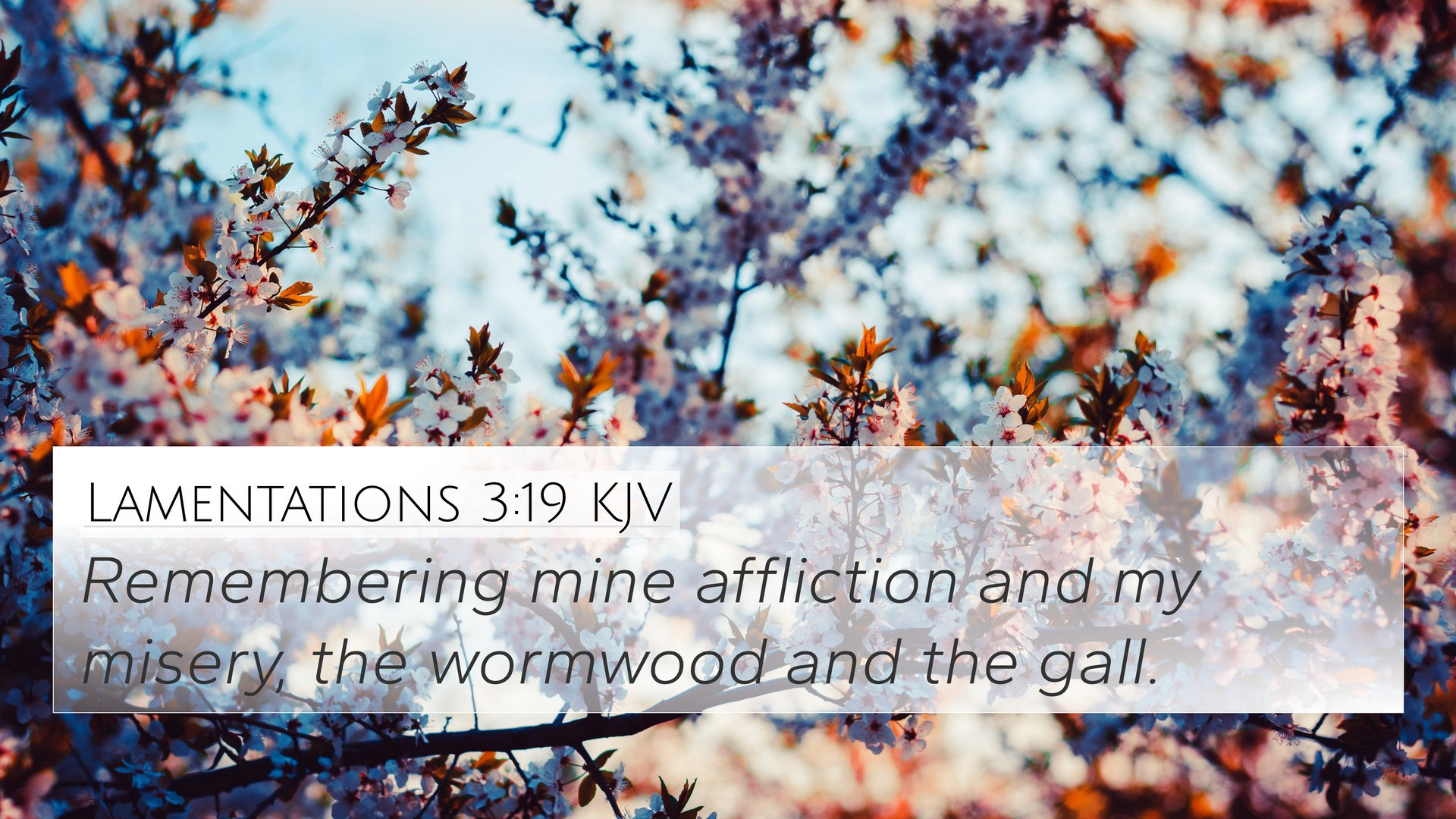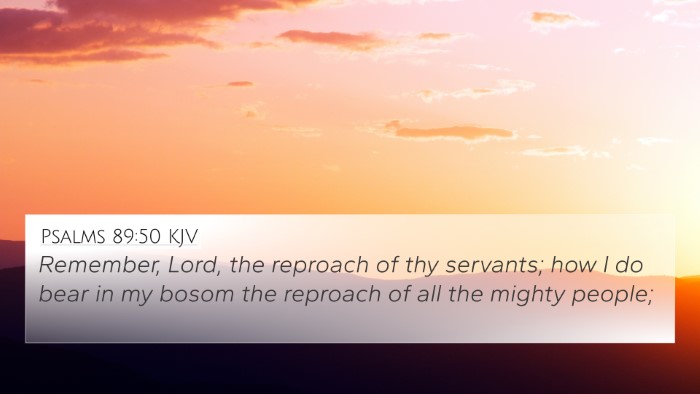Lamentations 3:19 - Meaning and Interpretation
Lamentations 3:19 states, "Remembering mine affliction and my misery, the wormwood and the gall." This verse encapsulates a poignant moment in the book of Lamentations, where the author reflects on their suffering and the deep sorrow that comes from it. The expressions "wormwood" and "gall" symbolize bitterness and anguish, demonstrating the emotional and spiritual pain that the author is enduring.
Insights from Public Domain Commentaries
According to Matthew Henry, this verse emphasizes the importance of remembering our trials and tribulations. He notes that such reminiscences encourage humility and a deeper appreciation for God's mercy. Remembering our afflictions helps to remind us of God’s past deliverances and encourages us to maintain hope amid present struggles.
Albert Barnes emphasizes that the act of remembering is a significant spiritual practice that leads to contrition and renewal. He points out that recalling one's sufferings is not merely an act of self-pity but a way to foster a longing for divine intervention and healing.
Adam Clarke highlights the specific words, "wormwood" and "gall," suggesting that they reflect the bitter experiences of life. He interprets these terms as metaphors for the suffering that one goes through, which is often like a bitter potion that one must swallow. Clarke suggests that these memories are vital for understanding the depth of one's reliance on God's grace.
Theological Implications
The implications of Lamentations 3:19 are profound. This verse requires an introspective examination of personal suffering and highlights:
- The human experience of pain and how it drives one closer to God.
- The process of spiritual growth that often arises from suffering.
- The necessity of remembering our past to appreciate God's current mercy.
Cross-References to Lamentations 3:19
- Psalm 42:3: "My tears have been my meat day and night, while they continually say unto me, Where is thy God?" - Reflects the deep emotional pain similar to that expressed in Lamentations.
- Jeremiah 9:1: "Oh that my head were waters, and mine eyes a fountain of tears, that I might weep day and night..." - Another expression of grief and longing.
- 2 Corinthians 1:3-4: "Blessed be God, even the Father of our Lord Jesus Christ, the Father of mercies, and the God of all comfort..." - English parallel of the importance of God's mercy amid suffering.
- Job 30:16-17: "And now my soul is poured out upon me; the days of affliction have taken hold upon me." - Job's reflections on his own suffering resonate with Lamentations.
- Hebrews 12:11: "Now no chastening for the present seemeth to be joyous, but grievous: nevertheless afterward it yieldeth the peaceable fruit of righteousness..." - Emphasizes growth through suffering.
- Psalm 119:71: "It is good for me that I have been afflicted; that I might learn thy statutes." - Showing a connection between affliction and learning.
- Romans 5:3-5: "...we glory in tribulations also: knowing that tribulation worketh patience..." - Affirms the redemptive purpose of suffering.
Thematic Connections
Lamentations 3:19 resonates with themes prevalent throughout the Scriptures, such as:
- Suffering: Many biblical figures, including Job and David, display the reality of pain in their lives.
- Hope: The contrast between despair and the hope found in God’s mercy remains a constant theme.
- Memory: The act of remembering previous afflictions is crucial in fostering gratitude for God's deliverance.
Using Cross-References for Deeper Understanding
Engaging with cross-references related to Lamentations 3:19 offers rich insight. Implementing tools for Bible cross-referencing can enhance understanding through:
- Bible concordance: Utilizing a concordance to find other verses related to suffering and memory.
- Bible cross-reference guide: These guides help trace thematic links across different scriptures.
- Comprehensive Bible cross-reference materials: These resources can aid in sermon preparation by linking ideas from various Bible verses.
Conclusion
In conclusion, Lamentations 3:19 serves as a reminder of the depths of affliction experienced by the author, yet it also opens the door to understanding the redemptive qualities of suffering through God's grace. By exploring this verse through a lens of inter-biblical dialogue and cross-referencing, readers can find encouragement and strength in the shared experiences of biblical figures and the hope found in God's unwavering love and mercy.
Through detailed comparative Bible verse analysis, we can understand the interconnectedness of God's word, providing comfort and insight into our own lives.










